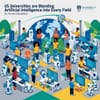US universities are at the forefront of integrating artificial intelligence (AI) into various disciplines, driving innovation and solving real-world problems. The Massachusetts Institute of Technology (MIT) is a leader in this field, with its Computer Science and Artificial Intelligence Laboratory (CSAIL) driving breakthroughs in AI that shape academia and industry. MIT's interdisciplinary approach to ethics, machine learning, and neural networks places it at the pinnacle of global AI education.
Stanford University has been a pioneer in AI since the 1960s, with its AI Lab producing world-class researchers and entrepreneurs. The university's curriculum combines strong theoretical foundations with entrepreneurial applications, allowing students to develop practical skills in AI.
Carnegie Mellon University is renowned for its AI research, particularly in the Robotics Institute, where robots can perform surgery and self-driving vehicles are being developed. The university's interdisciplinary approach ensures that students understand AI's broader applications and implications.
The University of California, Berkeley, and the University of Washington are also making significant contributions to AI research and education. UC Berkeley's AI Research Lab (BAIR) fosters collaboration between students, faculty, and industry experts, while the University of Washington's Paul G. Allen School of Computer Science & Engineering is a rising force in AI, with strengths in natural language processing, computer vision, and interdisciplinary research.
AI is being applied in various fields, including healthcare, where it's used in medical imaging analysis, disease diagnosis, and personalized treatment plans. In robotics and autonomous systems, AI is used in self-driving cars, drones, and robots that can work alongside humans. AI-powered adaptive learning platforms are also being used in education to personalize instruction for each student, improving outcomes for diverse learners.
The integration of AI into various disciplines is transforming the way research is conducted and applied, driving innovation and solving real-world problems. As AI continues to evolve, it's likely to have a profound impact on many fields, from healthcare and education to cybersecurity and environmental sustainability.


